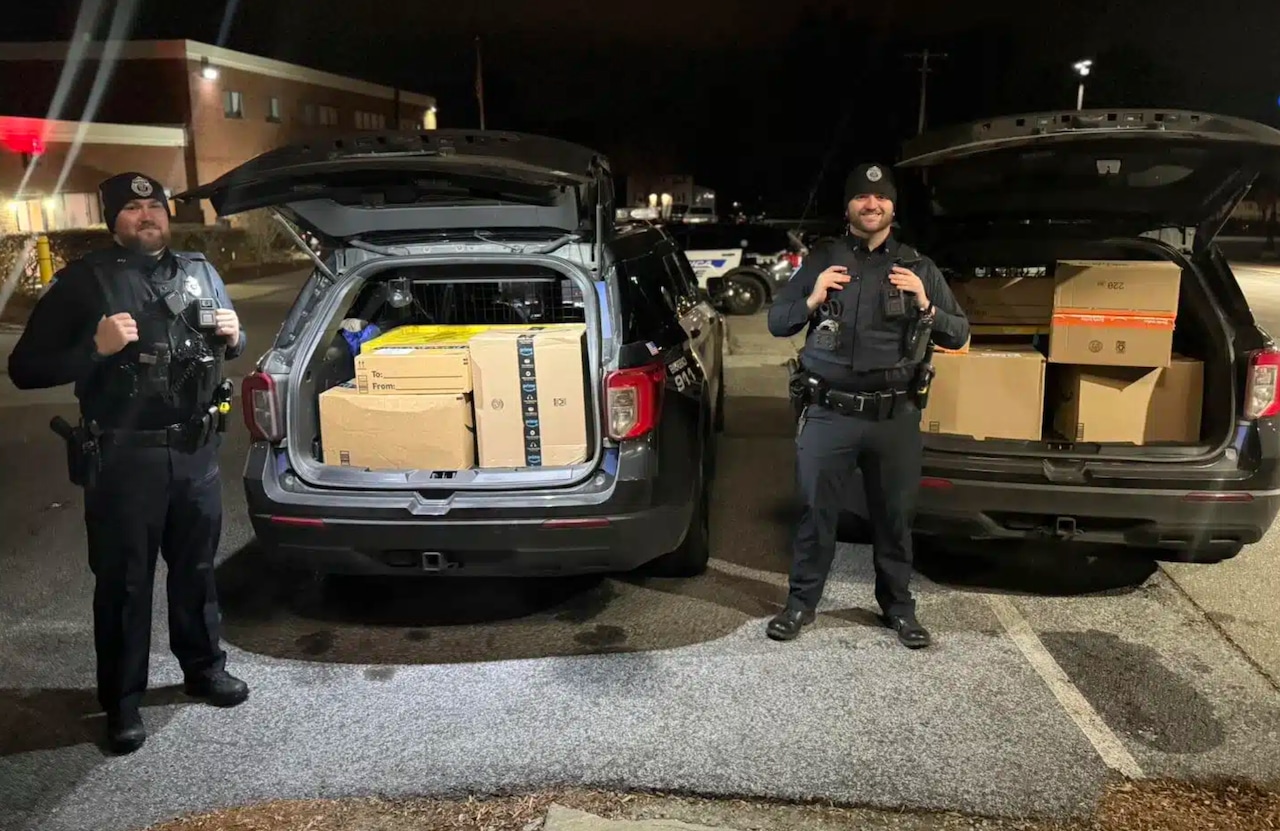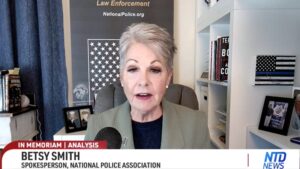
Local Breaking Police News

24 hours ago
More than 15 Amazon packages found abandoned on Mass. roads
For the second time in weeks, a Massachusetts road turned into an Amazon drop zone — leaving more than 15 large packages stranded until “Santa’s helpers” in blue came to the rescue.At about 8:10 p.m. on Nov. 25, Billerica Police Officer Samuel Hawkes was on proactive patrol when he saw eight packages in the middle of the road in an area behind Towne Plaza. All packages were intended for Billerica addresses, so Hawkes and Officer Matthew Irwin began delivering the packages to their intended destinations. A few days later on Dec. 2, Officer Thomas Huff was on proactive patrol in the area of the 129 Plaza, which is located at 258 Salem Road, around 1:15 a.m. when he also found eight Amazon packages scattered on the ground. Again, all the boxes were still sealed and addressed to Billerica residents. Huff then also delivered the eight packages to their intended recipients.“These two incidents really highlight the care that Billerica Police officers put into their jobs, whether they are responding to a major emergency, or just ensuring that residents get lost packages during the holiday season,” said Chief Roy Frost. “I am proud of these three officers.”Amazon was notified by police of both incidents. Amazon declined to comment on the situation to MassLive. Last year, an Amazon driver in Lakeville abandoned 80 packages in the woods just days before Christmas “because they were stressed,” NBC News reported. In 2021, CNN reported drivers would quit in the middle of their shifts because of the number of packages they were expected to deliver. And in 2020, an Amazon driver quit and abandoned his delivery truck at a metro Detroit gas station, according to 7 Action News.
24 hours ago
Meet Red Sox 6-foot-5, 240-pound prospect focused on ‘putting on size, muscle’
Red Sox 2025 draft pick Barrett Morgan’s 33 appearances in two seasons at Cowley Community College in Arkansas City, Kan., all came out of the bullpen, and he dominated. He posted a 0.42 ERA, 0.75 WHIP, four saves and 40 strikeouts in 21 ⅓ innings this past spring.The Red Sox have not yet decided whether they will keep the 20-year-old righty in a relief role to begin his professional career (and potentially fast track him) or stretch him out to start.“I think that’s probably just going to be more determined by spring training and the start of the season,” Morgan said by phone Tuesday. “Right now we’ve just been focused on getting bigger, stronger, faster and ready for the season.”Bigger?Morgan already is 6-foot-5, 240 pounds. How much bigger can he get?“Around the time of the draft and this last year at Cowley, I was about 230. I just peaked out at 240 the other day so just putting on size, putting on muscle,” said Morgan, who has worked with Red Sox nutritionists. Earlier this offseason, MassLive named Morgan one of five Red Sox prospect breakout candidates for 2026. He’s so intriguing because of his size, fastball and projectability. He also already has expanded his pitch mix since entering the organization.He’s not your typical 328th overall draft pick. Boston gave him a $500,000 bonus, the third highest signing bonus among the 11th round picks.He’s one of only 15 draft picks from Rounds 6-11 who received a bonus of $500,000 or higher. It was enough to convince him to turn pro instead of keeping his commitment to Texas A&M.“Going into the draft, I had a number in mind,” Morgan said. “Me and my family came up with it as like, ‘I feel comfortable with this number. I feel like I could live on that for three, four years in the minor leagues.’ And so then day two of the draft, I think it was probably around 8:30, 9 o’clock maybe, I was sitting in class at A&M and got a call from my agent with the offer and it was an absolute no-brainer decision.”Morgan has come a long way in just a few years. He underwent Tommy John surgery at the beginning of his junior year of high school. His only college offer out of high school came from Cowley. And he received that one offer only after then-Cowley pitcher Isaac Stebens — a fellow Stillwater, Okla., native who now is a Red Sox minor leaguer — helped.“I played baseball with his younger brother for many years,” Morgan said. “So he actually put in a good word for me with the coaches up there. So that’s how I landed at Cowley and then had two great years there.”Morgan reported to Fort Myers after signing. He spent the rest of the regular season there. He went home for a brief time and then returned to the JetBlue Park complex for another six weeks this fall. He just completed his most recent work there and returned home to Stillwater about a week and a half ago.He throws a four-seam fastball, sweeper and cutter, and he’s currently working on a fourth pitch.“Working on a splitter/changeup right now. That’s been the big one, trying to get that nailed down,” he said.“Just to have something going away from left-handed hitters,” Barrett added. “Right now, all my stuff is going into them. So I need something to be able to go away from them. So that’s why we’re playing around with different changeup grips and different splitter grips to try to get something to where a left hander is having to look away.”During his 2025 collegiate season, Morgan sat around 93-94 mph with his fastball while getting up to 95-96 mph. He topped out at 97 mph at times.MLB.com’s Jim Callis noted that Morgan has “good fastball metrics.”“Just having good vertical break on it so it holds its plane well,” Morgan said. “I didn’t really know that super well until I kind of got the Fort Myers. It’s like when people say, it’s got good life on the fastball, it means it’s got good, good vertical carry to it.”He threw a slider in college but it’s become bigger and developed into a sweeper with more glove-side movement. “Just being down there for a couple months ... I’ve already learned so much,” Morgan said. “So just getting ready to go back in spring training and then get sent out to an affiliate. This has probably been the most excited I’ve ever been for a season in, like, I can’t remember. Probably maybe when I was coming back from injury in high school. I could not be more excited to get going this year.”
1 day ago
Here’s how the draw will work for World Cup 2026 on Friday
WASHINGTON (AP) — The draw for the 2026 World Cup takes place Friday at the Kennedy Center, for the purpose of dividing the 48-team field into 12 groups of four. Once the tournament starts, 32 teams will advance from those preliminary groups to the single-elimination knockout rounds.The 12 round-robin World Cup groups are designated Group A, Group B ... and so on, down to Group L.Here’s an explanation of how the draw works.Picking from potsBalls corresponding with the competing countries will be separated into four pots of 12, and each group will include one team drawn from each pot. The pots are as follows, with each team’s current FIFA ranking in parentheses.Pot 1Spain (1), Argentina (2), France (3), England (4), Brazil (5), Portugal (6), Netherlands (7), Belgium (8), Germany (9), United States (14), Mexico (15), Canada (27).Pot 2Croatia (10), Morocco (11), Colombia (13), Uruguay (16), Switzerland (17), Japan (18), Senegal (19), Iran (20), South Korea (22), Ecuador (23), Austria (24), Australia (26).Pot 3 Norway (29), Panama (30), Egypt (34), Algeria (35), Scotland (36), Paraguay (39), Tunisia (40), Ivory Coast (42), Uzbekistan (60), Qatar (51), Saudi Arabia (60), South Africa (61).Pot 4Jordan (66), Cape Verde (68), Ghana (72), Curaçao (82), Haiti (84), New Zealand (86), UEFA Playoff A, UEFA Playoff B, UEFA Playoff C, UEFA Playoff D, FIFA Playoff 1, FIFA Playoff 2.The host countriesthe U.S., Mexico and Canada — are allowed into pot 1. That’s a significant perk because it means they avoid being in a group with several of the tournament’s top teams. It has already been determined that Mexico will be put in Group A, Canada in Group B and the U.S. in Group D.Also, the top four teams in the FIFA ranking — Spain, Argentina, France and England — will be drawn in such a way that, should they win their groups, they would not face each other before the semifinals.PlaceholdersSix of the balls in pot 4 do not correspond with any specific country. That’s because six spots at the World Cup won’t be determined until March. Four European teams will qualify via the UEFA playoffs, and the additional two FIFA playoffs will include teams from all over the world.The UEFA Playoff A winner will be either Italy, Northern Ireland, Wales or Bosnia-Herzegovina. UEFA Playoff B will be contested by Ukraine, Sweden, Poland and Albania, UEFA Playoff C by Turkey, Romania, Slovakia and Kosovo, and UEFA Playoff D by Denmark, North Macedonia, the Czech Republic and Ireland.New Caledonia, Jamaica and Congo will compete in FIFA Playoff 1, and Bolivia, Suriname and Iraq in FIFA Playoff 2.Wait, Italy hasn’t qualified yet?Italy, a four-time World Cup champion, actually hasn’t qualified since 2014! But the Italians — currently ranked 12th in the world — still have a shot to make it this time. So teams this week are likely hoping to avoid being drawn into a group with the UEFA Playoff A placeholder.Additional constraintsThe draw will be conducted while keeping some additional requirements in mind:— Each group must have at least one European team, but no more than two.— Aside from UEFA (Europe), no two teams from the same confederation can be in the same group. The other confederations are the AFC (Asia) and CAF (Africa), CONCACAF (North and Central America and the Caribbean), CONMEBOL (South America) and the OFC (Oceania).(In a couple quirks of global soccer, Suriname plays in CONCACAF and Australia plays in the AFC — but New Zealand is part of the OFC.)Possible groupsAlthough the pots are largely in descending order of FIFA ranking, there’s still plenty of potential variance in how challenging a group might be, especially since pot 4 could yield either a traditional power like Italy or a World Cup newcomer like Curaçao.Argentina, Morocco, Norway and Italy — if it qualifies — could be a particularly challenging group.Canada, Austria, South Africa and New Zealand would seem a lot less imposing.When do we learn the schedule?There is a full reveal of venues and game times set for Saturday, although game dates for the three host countries have already been revealed.Canada: June 12 (Toronto), June 18 (Vancouver) and June 24 (Vancouver).Mexico: June 11 (Mexico City), June 18 (Guadalajara) and June 24 (Mexico City).United States: June 12 (Los Angeles), June 19 (Seattle) and June 25 (Los Angeles).
1 day ago
Snow squalls to hit Mass. on Thursday with subzero temperatures on radar
Residents across Massachusetts should brace for a sharp drop in temperatures Thursday as an arctic front sweeps through, bringing the risk of snow squalls to parts of the state.Snow squalls capable of producing “up to a few inches” of accumulation are possible during the Thursday evening commute in Western Massachusetts, especially in The Berkshires, according to the National Weather Service.Additionally, flurries could hit some parts of Eastern Massachusetts between 11 a.m. and noon, including the Greater Boston area. Forecasters are still monitoring the exact timing of the snow bands and had not issued any winter weather advisories as of Thursday morning.While snowfall totals will be minimal, visibility could deteriorate quickly in any squall that develops. Drivers are warned to prepare for rapidly changing conditions, especially in Western Massachusetts during the afternoon and evening commute when the front is expected to move through.Winds between 25-40 mph — with gusts over to 45 mph in The Berkshires — will develop throughout the day, forecasters say, intensifying the cold air moving in to the state.Temperatures will hover in the 20s and 30s during the day, with highs near 29 degrees in Pittsfield and around 35 degrees in Worcester and Springfield. Boston will see slightly milder conditions at about 38 degrees.But the real chill arrives overnight, when readings plunge into the negatives in northwestern areas and into the single digits and teens elsewhere, forecasters say.As skies clear — and if winds diminish enough, as expected — temperatures could dip as low as -10 degrees in parts of Western Massachusetts and The Berkshires, especially those in highest elevations. In other areas, the projected wind chill could make temperatures feel like 10 degrees. Forecasters are eyeing another frigid day on Friday as temperatures struggle to rise out of the 20s and low 30s statewide. Additionally, more precipitation could be on the way Friday night, with a snow and rain mix on the radar over Cape Cod & the Islands. The weekend also brings chances of snow showers on Sunday night, as temperatures fluctuate between the 20s and 30s across the state on Saturday and yet another arctic front moves in before Monday.
1 day ago
People in Business: Dec. 8, 2025
The Springfield Museums elected new members to its Board of Trustees at the annual meeting of corporators, held on Sept. 24. The newly elected trustees are Jon Berthiaume and Dr. Natasha McKay with Dr. Mark Keroack named board chair. Kate Kane was also named to the Trustees Emeriti and two new corporators were elected, bringing the total number of Springfield Museums corporators to 325.The Museums received a Springfield Preservation Trust award — its fifth preservation award since 2018 — for restoration of the monumental entrance to the D’Amour Museum of Fine Arts.Former CEO of Baystate Health, Keroack is a graduate of Amherst College and Harvard Medical School and received his MPH from Boston University. He trained in internal medicine and infectious diseases at Brigham and Women’s Hospital in Boston.Berthiaume is a lifelong resident of Springfield and has served in executive brand marketing leadership roles at MassMutual and eBay. He is currently a board member for the Spirit of Springfield Inc. and was the banquet co-chair for the 2020 National Conference for Community and Justice.Since relocating to the Springfield area from New York City in 2005 to join Mercy Medical Center as a neurosurgeon, McKay has held positions such as serving on the Board of Directors of the Colony Club and is currently completing her second term on the board of the YWCA. McKay also serves on the Board of Directors of Mercy Medical Center. Kane has been a longtime supporter of the Springfield Museums in many roles. She works as a wealth management advisor for Northwestern Mutual. Her community commitments include co-founding the Western Massachusetts Dress for Success affiliate and the Worcester Dress for Success affiliate organization. Her board involvement has included the Women’s Fund of Western Massachusetts, the Sisters of Providence Health Systems, and Friends of the Homeless. Kane has recently been appointed chair of the board at Elms College.************************************************************Sen. Jo Comerford, D-Northampton, received the inaugural Policy Trailblazer Champion Award, along with Representative Brandy Fluker-Reid, D-Boston, from the Executive Office of Labor and Workforce Development and the statewide Massachusetts Caregiver Coalition.Comerford was recognized for her leadership on major family caregiver legislation, including a bill she filed this session to strengthen support for family caregivers in the Commonwealth. Comerford has filed legislation to support caregivers in every session that she has served.Awarded for the first time this year, the Policy Trailblazer Champion award recognizes policymakers who demonstrate exceptional leadership and dedication to advancing caregiver support across the commonwealth. ******************************************************************
1 day ago
Mark Marfione brings championship experience as new Brookline boys hockey coach
After three years at Marblehead High School, Mark Marfione decided to look for work in special education a bit closer to his home in Somerville.A part of that search also involved looking for a new boys hockey team to coach.What he found was a position in the special education department in Brookline, and an offer to be the high school’s new boys hockey head coach.“I live in Somerville and the commute to Marblehead was getting to be a little bit much,” Marfione said. “I’m always going to miss Marblehead but just having a new opportunity is nice and I think it’s always fun going into a new league and kind of figuring out the league and seeing what you got to do to compete.“It’s important for me to coach and work in the same district. It just makes sense to be on the same schedules as the kids and then get to see them in the day. I think it’s always the best setup. So that was the other plan going in, finding a school where I could coach and work at.”Marfione joins the Warriors after three years in charge at Marblehead and five years at Cambridge Rindge & Latin before that.Marfione consistently had both programs in the playoffs and contending for state titles. In five of his eight years as a head coach, he finished the year with double-digit wins.In just three years with the Magicians, he tallied 47 wins including the 2024 MIAA Division III state title despite starting the season 0-6.“We’re excited to have Coach Marfione joining our school as an educator and as a coach,” Brookline Athletic Director Kyle Williams said in a statement. “He has demonstrated success leading programs in both Marblehead and Cambridge and we look forward to him continuing the positive direction of our program. “Coach Marfione is all about preparation and details and we believe he will be able to connect with our student-athletes to help them understand the value of hard work and doing the many little things required to lead a team to success both on and off the ice.”As he heads into his first season with Brookline, Marfione said he’s picked up plenty of lessons during his last two stops.“It was an amazing experience, I’ll always share it with the boys,” Marfione said of the crown. “But I think it’s just learning from everywhere you go and kind of just taking things with you from one job. “I think for me, assistant coaches are always just as important as a head coach. I had some great ones in Marblehead, great ones in Cambridge... I think the most important thing is getting a good coaching staff around you, I think that’s something I really learned in Marblehead. Just trust the assistant coaches and have it be a group effort so you can really get to the details and find the strengths of every coach and let them show what their strengths are, and the identity of the team is going to take that on from all the coaching and the adults.”With the Warriors, Marfione will be assisted by a new staff, some of which were interested in the team’s head position.“Brian Colella is one of them, and the other one is Shane Devlin who played at Waltham, and him and Brian coached together,” Marfione said of his assistants. “It was just getting to talk to them and thinking they’re great fits. Also we have a former player who’s just an awesome kid, he’s only 20, his name is James Redding. He’s just an awesome kid and just really well versed in hockey and very mature.“I think it’s always important to have some young guys on the staff that can be even more relatable to the kids. It’s just making sure the kids have every type of adult they need and all the support and people to kind of guide them the right way every step.”Aside from his assistants, Marfione will also be relying on some of Brookline’s returning players to help with the transition.In particular, Marfione will be looking to senior Owen Lacy who was one of the team’s leaders last season and is the only captain to start the preseason.“I know he’s a good player just from hearing from other people,” Marfione said of Lacy. “I think he’s just someone that all the kids respect and seems like he does things the right way. He takes care of his schoolwork, he treats everyone with respect, he’s nice to the younger kids, the older kids, and everyone just kind of follows his lead.“So he seems like he has a lot of the characteristics you’re looking for in a leader.”Lacy however won’t be the only designated leader for the Warriors this season. Marfione intends to name other captains as the preseason continues, but wanted to wait and see how they fared in tryouts and practices before making anything official.Though it’s still early, Marfione said that he’s been impressed with the character of his squad, even if he’s not sure yet how they’ll all fit on the ice together.“Most important for me is not so much the talent as the kids getting along with each other and like each other and they’re dedicated,” Marfione said. “So far they all seem that way which is nice and then we’ll kind of see what we have for talent and build the best team we can.”Over the last few seasons the Warriors have struggled to stand out amongst a crowded field in the Bay State Conference. Last season the team won seven games, its most since 2022, including a midseason upset over Braintree, but failed to make the new state tournament for the fourth year in a row.Regardless of the team’s recent history and the state of the rest of the conference, Marfione is not afraid of Brookline’s schedule.“I’m excited, I know it’s got a great reputation as being one of the best, if not the best, public school league so I’m excited for the challenge,” Marfione said of the Bay State Conference.He understands that with a new team and new group of players, comes a more gentle progression of the on-ice product.“I’m not going to ask the world of them,” Marfione said. “Just to show up, be on time, and be coachable, be team first, work hard. If you have that, then we just gradually build throughout the year and keep getting better.“I think you start as basic as we can then once we build day-by-day we get into more details and more details, and hopefully by the time tournament comes around we’re really good on the details and we’re ascending.”What does not help is the relatively short window that Brookline has between its first tryouts and the start of the regular season.After kicking things off on Monday, Dec. 1, the Warriors will have two scrimmages on Saturday and Sunday before opening the regular season at home against Algonquin on Saturday, Dec. 13.“It’s a little tricky having them back to back, we don’t want to try to throw too much at them,” Marfione said of his scrimmages. “We’re not going to come in for a scrimmage with every system in place, every detail in place. Maybe install one or two things before the first scrimmage and gradually grow.“Then after that you get the game tape and then we’ll have five or six ice times in between the last scrimmage and the first regular season games... Just really start with the basics and the foundations and then kind of build up from there and hopefully be ready for Algonquin.”
1 day ago
Eclectic Finds at the Bismarck to host Holiday Shop and Stroll Pop-up
WESTFIELD — A Holiday Pop-up Shop & Stroll over the next three weekends at Eclectic Finds at the Bismarck Hotel on 16 Union St. will feature area crafters and a visit from Santa. The pop-up, which will also be collecting donations and non-perishable food for the Westfield Food Pantry, will run Saturdays and Sundays, Dec. 6-21, 10 a.m. to 4 p.m. Don't miss free selfies with Santa on Dec. 6, 1 to 4 p.m. Santa will be collecting donations and non-perishable food items for the Westfield Food Pantry. (SUBMITTED)The Westfield NewsSaturday, Dec. 6, will feature free selfies with Santa from 1 to 4 p.m. Donations for the Westfield Food Pantry, which is running its annual appeal, will be accepted. There will also be a box for donations of non-perishable food items, such as pasta, rice, canned fruits & vegetables, peanut butter and cereal.Pop-Up organizer Casey Goudreau of Southwick, a crafter specializing in hand-painted chalk signs, said each weekend will feature different local crafters, small businesses and vendors.Laura Daly, owner of Eclectic Finds at the Bismarck, is hosting the Holiday Pop-Up Shop & Stroll.
1 day ago
Westfield High School interns excited about opportunities
WESTFIELD — Before introducing Westfield High School Career Center Counselor Patty Healy to the School Committee on Dec. 1, Principal Charles Jendrysik said the internship program for seniors at the school is thriving. “We’ve had our internship program going for a number of years now, but this is the third year that it’s run under Patty. We’ve seen it grow, we’ve seen the quality of the programming grow, and the quality of the internships get stronger throughout the years, and we thought it would be exciting for you guys to hear some of the experiences that our students are having in the community,” Jendrysik said.Healy, who had brought five students with her to speak about their internships, said there are currently 38 students, all seniors, in the program this semester, and the interest continues to expand.She said the career center has evolved a little bit, and they are getting some great true internships in career fields the students are interested in learning more about before they graduate from high school.The largest area is the medical field. Healy said she has students in physical therapy, radiology, oncology, skilled nursing and behavioral health. She also has her first student intern in the engineering field at ProAmpac. The second largest area of interest is education, with students in both the middle school and elementary schools. She also has students at Armbrook Village, the Westfield Fire Department, Westfield Dispatch 911 and Mountainview Landscaping.“One of my favorite things to see was watching one of my students put up the goal posts. Almost everyone here I have seen in action; it’s one thing I require of the students to go see them in their positions,” Healy said. She said she also had the unique experience of going to the Westfield Fire Department and watching one in action there, while another was coming over the dispatch. She then introduced the student interns.Mohammad Awais Shahid said he was in his second year interning at the school’s Free Web Clinic, in which students redesign and create websites for local businesses and organizations using WordPress. Shahid said it has helped him apply his knowledge to real-life situations, and he is more aware of the skills he needs to succeed in the field. He plans to go to college for cybersecurity, web design and development. “I’m excited to keep learning as I complete my placement,” he said.Chris Shea is interning at the Westfield Fire Department on Broad Street. “It has really opened my eyes. A few of my uncles are firefighters, and this internship has helped show me I really want to do it,” Shea said. He mentioned that the two firefighters who are mentoring him are “amazing.” “I go on ambulance calls – I can’t do anything, just watch.” Shea said he signed up for an EMT course at Westfield State University in January and plans to work for an ambulance service, and then sign up to be a paramedic.Jack Stathatos, who is an intern at Westfield Regional Dispatch, said he also wants to be a firefighter. “I have been able to see how all situations play out. I’ve talked to people over the radio; I’ve dispatched Chris. I want to join an EMT program and start my journey to become a firefighter,” Stathatos said. He said he will continue to get a paramedic’s license and then enter the field as an intern, or through an ambulance service.Kylee O’Grady said her plans after high school are to attend a 4 + 1 college, where she will double major in education and math. Her internship has placed her at Westfield Middle School in an Algebra I class with Mrs Guyott. “I feel very fortunate to have the opportunity. The internship has allowed me to help in the classroom, teach and lesson plan, and form relationships with the students. It gives you hands-on experience in the career you want to spend the rest of your life in,” O’Grady said.Morgan Harlin has an internship at Holyoke Medical Center in the oncology unit. She said not only has the internship confirmed that she was correct in what she wanted to do with her future, but it helped her grow and become more confident in her future career. She said the staff is always supportive and goes above and beyond to explain new things.“The amazing patients are just the same,” Harlin said. Starting my day with them every morning has been a blessing.” She said she plans to become a nurse practitioner specializing in oncology.“If you listen to all five of them, they are all five of them in areas to help other people. I congratulate you all on what you’re doing with them,” said School Committee member Bo Sullivan after they spoke.“For seniors, I think this type of program is extremely beneficial. It gives them a chance to see a future career in action for good or for bad before attending college. They also learn from numerous individuals at each location. Students not only learn the ins and outs of the career, but they learn the path others took to get there,” Healy said after the meeting.She said all of the internships right now are unpaid, but she is open to placing students in paid internships as well. She tells the students it’s a learning process. “You’ve got to put your time in. If you finish what you started, do a good job, prove you’re a good worker, it sets the stage.”Healy said she is always open for someone to offer a position for a student. Usually, a student comes to them with ideas, but if the reverse happens and a business comes to them offering a position, they will try to find someone to fill the position.There are currently students waiting in three big areas, electrical, esthetician-cosmetology, and medical, where they are working on getting more placements. She said Baystate Noble and Holyoke Medical Center have been wonderful, and they’ve reached out to a few other places.Healy said if any business is interested in getting a student intern, they can reach out to the Westfield High School office and let them know the position, the qualifications needed and the time of day. She said the goal is 10 hours minimum, although they do have students who spend more time than that, including one at the ER who stays late outside of internship hours one day a week because he loves it.“I have the greatest job at the high school. It’s wonderful,” Healy said.
MORE ARTICLES BELOW ...

November 6, 2025
The National Police Association Supports the “Larry Henderson Act” in Written Testimony to Ohio House Judiciary Committee
INDIANAPOLIS, Nov. 6, 2025 / — The National Police Association (NPA) has submitted written testimony to the Ohio House Judiciary Committee in support of the Larry Henderson Act (H.B. 372), a vital measure sponsored by Representatives Cindy Abrams (29) and Phil Plummer (39) that ensures convicted killers of police officers and other first responders face the maximum, unmitigated penalty under Ohio law. The testimony can be read here. In the testimony presented by NPA Legislative Director Paula Fitzsimmons, the NPA called on lawmakers to end the re-traumatization of families of fallen officers by closing the parole loophole for those convicted of the aggravated murder of a law enforcement officer. “When a police officer is killed in the line of duty, their families, loved ones, and colleagues experience unimaginable grief,” Fitzsimmons wrote. “This gaping wound gets ripped open when an offender becomes eligible for parole.” Under current Ohio law, the death penalty or a life sentence may be imposed for the intentional killing of an officer, but parole eligibility can still arise in certain circumstances. The Larry Henderson Act eliminates that possibility, requiring courts to impose either the death penalty or life without parole. It also extends those same protections to prosecutors, first responders, and military personnel targeted because of their service. This legislation comes amid a surge in violence against police. According to the FBI, 85,730 officers were targeted in the United States last year alone, the highest number in over a decade. The NPA emphasized that this bill represents a moral and legal commitment to the safety of those who protect the public, ensuring that the justice system delivers certainty and closure for their families. “The Larry Henderson Act ensures that the full force of the law is applied to those who intentionally kill our nation’s protectors,” said Fitzsimmons. “Justice demands nothing less.” The NPA urges Ohio lawmakers to adopt the Larry Henderson Act as a substantive strengthening of public-safety protections in the State. By doing so, Ohio sends a clear message: attacks on those who protect us will be met with the full force of justice. About: The National Police Association (NPA) is a nonprofit organization dedicated to supporting law enforcement through advocacy, education, and the courts. For more information, visit NationalPolice.org. ###
October 31, 2025
The National Police Association Endorses Proposed House Resolution Condemning the Rise in Violent Attacks Against ICE Agents
Indianapolis, IN, October 30, 2025 – The men and women of Immigration and Customs Enforcement (ICE) work tirelessly to remove those accused of murder, trafficking, and terrorism from our streets. Instead of receiving praise and gratitude, agents are subjected to doxing attempts and distortions. Assaults and threats on ICE officers have surged, and bounties have been placed on their lives. In response, Reps. Russell Fry (SC-07), August Pfluger (TX-11), Roger Williams (TX-25), and Pete Sessions (TX-17), introduced resolution (H.Res. 767) in the House of Representatives to disavow the growing wave of violent attacks against ICE agents. It is endorsed by the National Police Association (NPA). The text for the resolution is here. Specifically, this resolution accomplishes the following: Denounces the rise in violent attacks and threats being made against ICE agents and facilities, and expresses regret for those -including detainees- who have been injured or lost their lives as a result; Affirms the essential role that ICE agents have in enforcing immigration laws, securing our nation, and keeping our streets safe; Asks the Department of Homeland Security and other federal, state, and local law enforcement agencies to investigate these attacks, and to create initiatives that protect from harm; “The harassment, assaults, and meritless hostility being leveled at ICE agents working tirelessly to uphold our nation’s immigration laws is shameful and should never be tolerated. The onus is on Congress to firmly reject this reckless behavior,” said Paula Fitzsimmons, Legislative Director, National Police Association. “This proposed House resolution sends an unequivocal message that assaulting an ICE officer is forbidden, and that incendiary language by elected officials and media outlets is inexcusable,” Fitzsimmons added. The NPA extends its gratitude to Reps. Fry, Pfluger, Williams, and Sessions for introducing a House resolution to denounce the rampant violence targeting ICE agents. ICE agents are central to enforcing our nation’s immigration laws, and deserve the firm backing of Congress. We encourage all congressional members to support this important resolution. To support anti-crime, pro-police legislation, join the NPA’s Call to Action team. Receive email alerts on bills, including which lawmakers to contact. About: The National Police Association (NPA) is a nonprofit organization dedicated to supporting law enforcement through advocacy, education, and the courts. For more information, visit NationalPolice.org. ###
October 29, 2025
Why Lawmakers Must Back Life-Saving Police Technology
What if your local community could be safer tomorrow—not years from now—because of breakthroughs happening in police technology today? As our world becomes more complex, so do the challenges faced by law enforcement officers on the frontlines. With rising threats and ever-evolving criminal tactics, it’s clear that standing still isn’t an option. Fortunately, recent innovations are changing the face of public safety, helping police officers do their jobs more safely, efficiently, and effectively. Powerful Tools with Proven Results You’ve likely noticed the growing use of body-worn cameras, advanced communications, AI-driven dispatch systems, and real-time crime monitoring in departments across the country. These aren’t just tech fads—they’re tools proven to increase officer safety, strengthen accountability, and support proactive policing. When officers wear body cameras, both community members and police benefit. Incidents are resolved faster, investigations are clearer, and public trust is easier to maintain. But that’s just the beginning. Departments equipped with automated license plate readers, gunshot detection systems, and modern forensic technologies are able to respond more quickly and close more cases, deterring future offenses and giving criminals far fewer safe havens. Remote monitoring and drone support allow officers to safely assess dangerous situations without unnecessary risk—saving lives in the process. The Real Impact While innovative law enforcement technology empowers officers, it also faces unjust scrutiny and even proposed restrictions in certain areas. Some critics overlook how these tools save lives and protect both citizens and officers from harm. With recent surges in assaults on first responders and the increasing sophistication of criminal organizations, innovation isn’t a luxury—it’s a necessity. Use Your Voice to Support Safer Communities Ensuring officers have the best available technology isn’t just about efficiency—it’s about survival. If implemented responsibly, new tools like body-worn cameras, dash cams, digital evidence lockers, and real-time intelligence platforms will continue to elevate public safety standards nationwide. If you want to see more positive change like this, I encourage you to take action: Let your federal lawmakers know you support responsible investments and legislation enabling departments to adopt life-saving technology. Encourage your friends and neighbors to stand with officers by joining our Call to Action (CTA) team. These actions—and your ongoing advocacy—are critical in ensuring that common-sense technology solutions help protect innocent lives and empower those who put themselves on the line each day.
October 22, 2025
The National Police Association Endorses Ohio Bill to Increase Penalties for Evading Arrest
Indianapolis – October 22, 2025 – Fugitives who construct physical barriers for the purpose of evading law enforcement create unsafe situations for officers, innocent civilians, and themselves. In these unpredictable situations, officers may need to order evacuations or lockdowns, disrupting entire neighborhoods. These situations -which can take hours, and even days, to resolve- also place a burden on police departments that may already be experiencing a scarcity of resources. In Ohio, where law enforcement has seen a sharp rise in these incidents, state Sen. Tom Patton (24) has introduced a bill (S.B. 188) to increase penalties for fugitives who barricade themselves to evade arrest. This bill, endorsed by the National Police Association (NPA), is currently in the state’s Judiciary Committee for deliberation. The text for the bill is here. With this bill, a suspect already under arrest for a felony or violent misdemeanor who sets up a barricade and refuses to comply with police orders would be charged with an additional third-degree felony. If the suspect places a third party at risk of serious physical harm, that charge is elevated to a second-degree felony. If the third party is a minor, it becomes a first-degree felony. Anyone assisting a suspect in these instances could be charged with a fourth-degree felony. “Fugitives who establish barricades to evade arrest are placing lives at risk, disrupting neighborhoods, and depleting valuable police resources. They need to be held to account for so blatantly disregarding the law,” said Paula Fitzsimmons, Legislative Director, National Police Association. “Sen. Patton’s Ohio state bill will penalize these lawbreakers accordingly and give law enforcement the leverage they need to de-escalate potentially threatening situations quickly. The suspect can choose to comply or risk facing additional charges and more time in prison,” Fitzsimmons added. The NPA extends its gratitude to Sen. Patton for introducing a bill that imposes harsher penalties for creating a barricade to evade arrest. At a time when Ohio is experiencing an increase in these incidents, this bill will provide police officers with a tool to end potentially perilous situations safely. We encourage the Ohio legislature to pass this important bill. To support anti-crime, pro-police legislation, join the NPA’s Call to Action team. Receive email alerts on bills, including which lawmakers to contact. About: The National Police Association (NPA) is a nonprofit organization dedicated to supporting law enforcement through advocacy, education, and the courts. For more information, visit NationalPolice.org. ###
October 9, 2025
The National Police Association Endorses the Transit Crime Reporting Act of 2025
INDIANAPOLIS, Oct. 9, 2025 — Millions of Americans rely on subways, buses, and other forms of public transportation to get to their jobs, classes, and appointments. In some cities, these transportation hubs have become magnets for lawlessness and heinous violent crimes. It isn’t just passengers who are at risk, either; assaults on transit workers have surged in recent years. The Transit Crime Reporting Act of 2025 (S. 2814), a bill introduced in the U.S. Senate by Sens. Tim Scott (SC) and Thom Tillis (NC), is designed to strengthen personal safety on federally funded transportation systems. It will accomplish this by improving how crime is tracked and mandating the creation of a task force to develop safety strategies. This bill, endorsed by the National Police Association (NPA), is currently in the Senate Banking Committee for deliberation. The text for the bill is here. This bill mandates the creation of a 13-member, multi-faceted task force, to be chaired by the Federal Transit Administration (FTA) administrator. Its additional 12 members will be representatives for various transit agencies and associations, law enforcement agencies, and transit employees. The task force would propose recommendations for improving safety on our nation’s public transportation systems, then submit a report with their findings to Congress. “Our nation has crossed yet another unacceptable line when people rightfully fear being victimized for doing something as routine as taking a bus or riding the subway,” said Paula Fitzsimmons, Legislative Director, National Police Association. “Provisions contained within the Transit Crime Reporting Act of 2025 will help mitigate the crime and lawlessness that has become rampant on our nation’s transportation systems,” Fitzsimmons added. The NPA extends its gratitude to Sens. Scott and Tillis for introducing the Transit Crime Reporting Act of 2025, a bill designed to improve safety on our nation’s public transit systems. Millions of Americans who use or work in public transportation are depending on our federal government to ensure their safety. This bill provides a solid path toward accomplishing that goal, and we encourage Congress to work toward its passage. To support anti-crime, pro-police legislation, join the NPA’s Call to Action team. Receive email alerts on bills, including which lawmakers to contact. About: The National Police Association (NPA) is a nonprofit organization dedicated to supporting law enforcement through advocacy, education, and the courts. For more information, visit NationalPolice.org. ###
September 23, 2025
The National Police Association Demands Records on Chicago Mayor Johnson’s Sanctuary Policy and Crime
Indianapolis — Sept 23, 2025 — The National Police Association (NPA) today announced the filing of a Freedom of Information Act (FOIA) request with the Office of the Mayor of Chicago. The request seeks detailed records on crimes committed in the city by illegal aliens, including data on arrests, recidivism, victimization, and the costs borne by law enforcement and the public. The purpose of this request is to determine whether Mayor Brandon Johnson’s sanctuary policies have jeopardized public safety, or whether the administration has failed, or refused, to evaluate and track the real-world impact of those policies. The full FOIA request can be read here. This action follows a series of troubling remarks by Mayor Johnson, who has repeatedly disparaged law enforcement since taking office. In September 2025, he claimed that “jails and incarcerations and law enforcement is a sickness that has not led to safer communities” and further stated he was “sick and tired” of police being offered to poor and minority neighborhoods “as if they were of no value.” “These statements are not just misguided—they are dangerous,” said NPA spokesperson Sgt. Betsy Brantner Smith (Ret.). “When the mayor of America’s third-largest city tells residents that policing itself is a ‘sickness,’ it emboldens criminals and signals that they should not be held accountable. Chicagoans deserve to know whether the Mayor’s sanctuary policies are compounding these dangers and contributing to rising crime.” The NPA’s FOIA request specifically seeks: Statistics (2023–present) on crimes committed by individuals without lawful immigration status, including violent and property crimes, drug and weapons offenses, and sexual assaults. Data on pre-trial releases, recidivism, and prior deportations of offenders. Victim impact data, including injuries, fatalities, and economic losses. Law enforcement resource impacts, including 911 response times and overtime costs. Comparative analyses of crime rates in sanctuary vs. non-sanctuary jurisdictions. With Chicago officers already strained by staffing shortages and hostility from their own mayor, the public has a right to know whether sanctuary policies are worsening risks. By compelling disclosure of this information, the NPA seeks to establish whether the Johnson administration possesses data that supports its policies, lacks such evidence altogether, or has deliberately chosen not to examine the facts. About: The National Police Association (NPA) is a nonprofit organization dedicated to supporting law enforcement through advocacy, education, and the courts. For more information, visit NationalPolice.org. ###
September 21, 2025
Chicago Mayor Johnson’s Sanctuary for Criminals: A War on Accountability
Since taking office, Chicago Mayor Brandon Johnson has made a sport of denigrating law enforcement, dismissing police and prisons as a “sickness,” mocking the presence of “badges and guns” in Black and Brown neighborhoods, and insisting Chicago must “stop relying on police” to keep order. These are not slips of the tongue. They are the creed of a radical soft-on-crime philosophy that imperils every honest citizen in the city. When Johnson sneers that the only thing offered to poor communities is “jails and police officers,” he betrays both ignorance and contempt. No serious person believes the cop on the beat is a substitute for jobs, schools, or housing. But the hard truth is this: without police, there are no jobs, schools, or housing worth protecting. Ask the shop owner whose store has been looted three times in a year if a social worker would have stopped the thieves. Ask the family of a murder victim if a housing voucher would have kept the triggerman from firing the gun. Ask the victims of violent crimes committed by illegal aliens if they would have preferred those criminals been removed first by ICE. Worse still was Johnson’s declaration that “law enforcement is a sickness.” Tell that to the family of Officer Ella French, gunned down in 2021 during a traffic stop. Tell it to the thousands of officers who kiss their children goodbye each morning, not knowing if they’ll come home. Smearing their sacrifice signals to the criminal element that the political class sees criminals as people who should never be held accountable. Hence, any anger they have toward law enforcement is justifiable. What Johnson proposes is not balance, it is substitution: replacing handcuffs with therapy sessions, and patrol cars with free needles. This is not justice. It is abdication. Chicago does not suffer from an excess of policing. It suffers from an excess of leniency. Violent offenders are cycled through the revolving door of the courts, only to return to the streets more emboldened than before. The victims of this leniency are the very people Johnson claims to champion: the working poor, the immigrant shopkeepers, the elderly who cannot afford to flee to safer suburbs. They do not ask for fewer police. They ask for safety. Mayor Johnson has cast his lot with the leftists who despise the thin blue line. In doing so, he abandons the ordinary citizen, who understands an eternal truth: civilization survives because men with badges and guns stand against the predators. Strip that away, and what remains is not justice, social or otherwise.
September 18, 2025
The National Police Association Backs Michigan Bill Cracking Down on Drivers Who Flee Police
INDIANAPOLIS, Sept. 18, 2025 — Evading police often results in high-speed, reckless driving that causes destruction, untold suffering, and loss of life. Innocent drivers sharing the road with the evader, unsuspecting pedestrians, police officers, as well as the suspect and the suspect’s passengers, are all placed in harm’s way. Michigan joins other states in the union that have seen a dramatic increase in fleeing from the police. This is happening because offenders know that law enforcement agencies have adopted policies that limit or prohibit chases. A bill introduced by Rep. Rylee Linting (027) in the Michigan House of Representatives (H.B. 4690) would amend Michigan’s criminal code to establish more stringent sentences, including a mandatory minimum prison term, for fleeing from police. This bill is currently in the Michigan legislature’s Justice Committee. The text for the bill is here. The bill also creates four levels of evading the police based on factors such as whether the evasion resulted in a car crash or serious injury, or the suspect has prior convictions. The minimum penalty ranges from 182 days in jail to five years imprisonment. “Instances of fleeing from police are occurring in greater frequency because offenders are taking advantage of no-chase or restricted-chase policies established by local governments. This blatant lawlessness is destroying lives and needs to be met with stricter consequences,” said Paula Fitzsimmons, Legislative Director, National Police Association. “Establishing stricter penalties that incorporate a mandatory minimum prison sentence for evading the police and upending lives is the correct prescription,” Fitzsimmons added. The NPA extends its gratitude to Rep. Linting for introducing a bill in the Michigan legislature to adopt stricter penalties -including a mandatory minimum sentence- for fleeing from police. These acts, which have dangerously trended upward, are destroying lives. This bill provides law enforcement, judges, and district attorneys with another tool to hold to account those who have such low regard for the lives of others and the rule of law. We ask all members of the Michigan legislature to support this bill, and encourage other states to adopt similar legislation. To support this and future anti-crime, pro-police legislation, join our Call to Action (CTA) team and receive email alerts on bills, including which lawmakers to contact. Sign up here. About: The National Police Association (NPA) is a nonprofit organization dedicated to supporting law enforcement through advocacy, education, and the courts. For more information, visit NationalPolice.org. ###
August 29, 2025
Austin, MN Police Department Chaplain Program Awarded Grant by the National Police Association
INDIANAPOLIS, Aug. 29, 2025 – The Austin, MN Police Department (APD) Chaplain program has been awarded a $1,000 grant by the National Police Association. The program is co-administered by Salt and Light Partners, a Minnesota nonprofit. In partnership with Salt & Light Partners, APD has established a Chaplain Program that pairs local pastors with law enforcement officers, creating a unique avenue of encouragement, counseling, and care. The program was designed to ease the burden of what can often be an emotionally demanding profession. Pastors from several local churches now ride along with officers, offering support during shifts and making themselves available for on-call needs. Their assistance ranges from accompanying officers on difficult calls, such as delivering death notifications, to being a compassionate presence after traumatic incidents. The program is not only designed for public interactions but also to support officers’ well-being. Law enforcement professionals often encounter trauma daily, which can affect their mental and personal lives. Chaplains provide a safe, confidential space for officers to process stress, relationship challenges, and other personal struggles. ###
MORE ARTICLES BELOW ...
December 4, 2025 12:46 pm




















